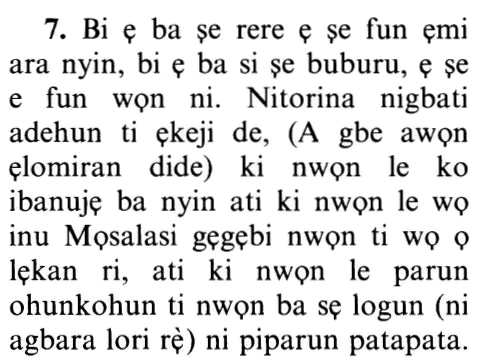17vs7
Select any filter and click on Go! to see results
إِنْ أَحْسَنتُمْ أَحْسَنتُمْ لِأَنفُسِكُمْ وَإِنْ أَسَأْتُمْ فَلَهَا فَإِذَا جَاء وَعْدُ الآخِرَةِ لِيَسُوؤُواْ وُجُوهَكُمْ وَلِيَدْخُلُواْ الْمَسْجِدَ كَمَا دَخَلُوهُ أَوَّلَ مَرَّةٍ وَلِيُتَبِّرُواْ مَا عَلَوْاْ تَتْبِيراً
In ahsantum ahsantum lianfusikum wain asatum falaha faitha jaa waAAdu alakhirati liyasoooo wujoohakum waliyadkhuloo almasjida kama dakhaloohu awwala marratin waliyutabbiroo ma AAalaw tatbeeran
Index Terms
Click to play
Yoruba Translation

Hausa Translation
Idan kun kyautata, kun kyautata dõmin kanku, kuma idan kun mũnana to dõmĩnsu. Sa´an nan idan wa´adin na ƙarshe(5) ya jħ, (za su je) dõmin su baƙanta fuskokinku, kuma su shiga masallaci kamar yadda suka shige shi a farkon lõkaci, kuma dõmin su halakar da abin da suka rinjaya a kansa, halakarwa.
Asbabu n-Nuzuul (Occasions of Revelation)
إِنْ أَحْسَنتُمْ أَحْسَنتُمْ لِأَنفُسِكُمْ وَإِنْ أَسَأْتُمْ فَلَهَا ...
(And We said): "If you do good, you do good for your own selves, and if you do evil (you do it) against yourselves.''
As Allah says elsewhere:
مَّنْ عَمِلَ صَـلِحاً فَلِنَفْسِهِ وَمَنْ أَسَآءَ فَعَلَيْهَا
Whosoever does a righteous good deed, it is for (the benefit of) himself; and whosoever does evil, it is against himself. (45:15)
The Second Episode of Mischief
Then Allah says:
... فَإِذَا جَاء وَعْدُ الآخِرَةِ ...
Then, when the second promise came to pass,
meaning, the second episode of mischief, when your enemies came again,
... لِيَسُوؤُواْ وُجُوهَكُمْ ...
(We permitted your enemies) to disgrace your faces,
meaning, to humiliate you and subdue you,
... وَلِيَدْخُلُواْ الْمَسْجِدَ ...
and to enter the Masjid,
meaning, Bayt Al-Maqdis (Jerusalem).
... كَمَا دَخَلُوهُ أَوَّلَ مَرَّةٍ ...
as they had entered it before,
when they entered the very innermost parts of your homes.
... وَلِيُتَبِّرُواْ ...
and to destroy,
wrecking and inflicting ruin upon it.
... مَا عَلَوْاْ ...
all that fell in their hands.
everything they could get their hands on.
... تَتْبِيرًا ﴿٧﴾
عَسَى رَبُّكُمْ أَن يَرْحَمَكُمْ ...
with utter destruction. It may be that your Lord may show mercy unto you,
meaning that He may rid you of them.
قوله تعالى " إن أحسنتم أحسنتم لأنفسكم وإن أسأتم فلها " أي فعليها كما قال تعالى " من عمل صالحا فلنفسه ومن أساء فعليها " وقوله " فإذا جاء وعد الآخرة " أي الكرة الآخرة أي إذا أفسدتم الكرة الثانية وجاء أعداؤكم ليسوءوا وجوهكم " أي يهينوكم ويقهروكم " وليدخلوا المسجد " أي بيت المقدس " كما دخلوه أول مرة " أي في التي جاسوا فيها خلال الديار " وليتبروا " أي يدمروا ويخربوا " ما علوا تتبيرا" أي ما ظهروا عليه .
"إن أحسنتم" بالطاعة "أحسنتم لأنفسكم" لأن ثوابه لها "وإن أسأتم" بالفساد "فلها" إساءتكم "وعد" المرة "الآخرة" بعثناهم "ليسوءوا وجوهكم" يحزنوكم بالقتل والسبي حزنا يظهر في وجوهكم "وليدخلوا المسجد" بيت المقدس فيخربوه "كما دخلوه" وخربوه "أول مرة وليتبروا" يهلكوا "ما علوا" غلبوا عليه "تتبيرا" هلاكا وقد أفسدوا ثانيا بقتل يحيى فبعث عليهم بختنصر فقتل منهم ألوفا وسبى ذريتهم وخرب بيت المقدس
أي نفع إحسانكم عائد عليكم .
I'raab - grammatical analysis of the Qur'an
«إِنْ» حرف شرط جازم.
«أَحْسَنْتُمْ» فعل الشرط ماض وفاعله والجملة ابتدائية.
«أَحْسَنْتُمْ» ماض وفاعله والجملة لا محل لها لأنها جواب شرط لم يقترن بالفاء .
«لِأَنْفُسِكُمْ» متعلقان بأحسنتم.
«وَإِنْ» الواو استئنافية وإن شرطية.
«أَسَأْتُمْ» ماض وفاعل والجملة ابتدائية لا محل لها.
«فَلَها» الفاء رابطة للجواب ولها متعلقان بمحذوف خبر لمبتدأ محذوف تقديره فلها إساءتها والجملة في محل جزم جواب الشرط.
«فَإِذا» الفاء استئنافية وإذا ظرف يتضمن معنى الشرط.
«جاءَ وَعْدُ» ماض وفاعله والجملة مضاف إليه.
«الْآخِرَةِ» مضاف إليه.
«لِيَسُوؤُا» اللام للتعليل مضارع منصوب بأن مضمرة بعد لام التعليل بحذف النون والواو فاعل واللام وما بعدها متعلقان بمحذوف جواب إذا والتقدير بعثناهم ليسوؤوا.
«وُجُوهَكُمْ» مفعول به والكاف مضاف إليه.
«وَلِيَدْخُلُوا» معطوف على ليسوؤوا وإعرابه كإعرابه.
«الْمَسْجِدَ» مفعول به.
«كَما» الكاف حرف تشبيه وما مصدرية.
«دَخَلُوهُ» ماض وفاعله ومفعوله والكاف وما بعدها في تأويل مصدر في محل نصب صفة لمفعول مطلق محذوف أي دخولا كائنا مثل دخولهم.
«أَوَّلَ» ظرف زمان منصوب.
«مَرَّةٍ» مضاف إليه.
«وَلِيُتَبِّرُوا» معطوف على ليدخلوا وإعرابه مثلهز
«ما» موصولية مفعول به.
«عَلَوْا» ماض وفاعله والجملة صلة.
«تَتْبِيراً» مفعول مطلق.
